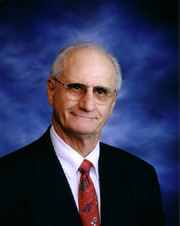Minard Duncan and the Doctrine of Unaccountability

A few days ago on this post about Pam Keller’s blank Collaborative calendar, we received a visit from FSD trustee Minard Duncan. As is usual, Minard’s visit was vacuous and inane. Just about what you’d expect from an educrat. Minard admitted his comments were just made to “rile” us up.
But what was really interesting was when Minard dropped this spud on the Friends, unwittingly revealing a mindset that reveals all the things wrong with Fullerton’s elected representatives:
School board members do not have any power as individuals. It takes three board members out of a five member board agreeing on an issue to have authority. We are the boss of the district superintendent and no one else but not as individuals only as a collective board.
See, Minard indicates that authority (power) is only to be exercised by a majority, and, moreover, through the conduit of a Superintendent – thus effectively removing the “elected” from actually having to do much of anything except hire a single underling and ratify his decisions. And of course the consequence of Minard-think is that the responsibility and accountability attendant upon elected office is conveniently dissipated through delegation to a host of protected bureaucrats who are never held accountable either.
But whoever thought that the absence of a majority meant that a boardmember was somehow robbed of any of the authority vested in him by the electorate? While it takes a board majority to act affirmatively on a specific issue, the authority of an elected is indivisible. Minard is not just a third of a potential majority, nor does he represent only a theoretical one fifth of the property tax payers and parents – although he doesn’t seem to grasp this idea.
It is each boardmember’s responsibility to concern himself with everything that goes on in his district and to take responsibility for it.
Minard-think leads to the complete dereliction of responsibility that seems to obtain not only at the FSD, but also at Fullerton City Hall, too, where electeds delegate responsibility right along with the authority they invest in their City Manager. And of course as any honest council watcher knows, the Council, through laziness and/or inclination, is completely in thrall to the Chief Bureaucrat who is supposed to be working for them. It’s rather like the Stockholm Syndrome.
And you know what? A lot of electeds and their bureaucratic masters sure seem to like it that way.
The FSD Board might as well be a LLC!
I just love the category “setting the bar low.” You can’t get any lower than Minus.
I think minard could use a drink.
Minard is using the Collaborative as a vehicle to make himself look important to his Rotarian buddies.
I know how Minard feels. After a while I became a member of the SLA.
Oh wait! Minard didn’t get kidnapped. He joined!
the truth is this bloatacrat gives $50,000 tax dollars to Keller laundered through fullerton collaborative.
This was a well-written diagnosis for what ails many local elected boards.
First, you’re told that the Brown Act forbids communication among colleagues. This discourages alliances and board initiative.
Then you’re told that any concern for the details of staff proposals or whether Board/Council directives are actually being followed amounts to “micromanagement:– a no-no- to bureaucracies.
“You set policy–let us carry it out however we want, or don’t want!” electeds are essentially told.
Staff is highly praised and given constant awards and plaudits, creating a self-congratulatory culture that discourages electeds from questioning anything.
Questioning and challenging staff performance is seen as disloyalty to the organization, not just by staff itself, but by electeds who want to marginalize any colleague who takes his/her job to govern seriously.
Agendas are controlled by staff–the lowliest staff person can place something on the agenda, while it is often difficult for individual electeds to do so. Most rarely initiate on their own, but simply respond to staff initiatives.
Some City Managers and Superintendents sit on the dais with their elected boards–as if they were equal, and many allow employee-elected communication only through them.
You see this attitude a lot on school boards and city councils–much less so among full time electeds with their own independent staff.
Don’t blame staff excusively. Many part-time electeds gladly abrogate their leadership responsibility to the “experts”. It’s just easier that way–at least in the short term.
Mr. Peabody,
Excellent response! I especially agree with paragraph 5. Individuals definitely do have the responsibility to know what is going on.
Thanks for adding that!
Minard
Mr. Duncan I can never undestand a comment you make, and I really want to give you the benefit of the doubt.
Please get off the board and give way to somebody who will take it seriously.